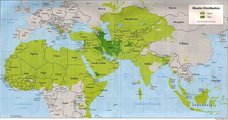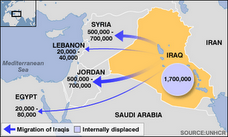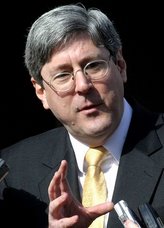How the CIA Failed America
May 11, 2007; Page A19
George Tenet sets the stage in his memoir by recalling a conversation he claims to have had with me on Sept. 12, 2001: "As I walked beneath the awning that leads to the West Wing[, I] saw Richard Perle exiting the building just as I was about to enter. . . . Perle turned to me and said, 'Iraq has to pay a price for what happened yesterday. They bear responsibility.' I looked back at Perle and thought: Who has [he] been meeting with in the White House so early in the morning on today of all days?"
But I was in Europe on Sept. 12, 2001, unable to get a return flight to Washington, and I did not tell Tenet that Iraq was responsible for the Sept. 11 attacks, not then, not ever. That should have been the end of the story: a faulty recollection, perhaps attributing to me something he may have heard elsewhere, an honest mistake.
So I was surprised when, having been made aware of his error, Tenet reasserted his claim, saying: "So I may have been off on the day, but I'm not off on what he said and what he believed."
On "Meet the Press" last Sunday, Tenet argued that his version "seems to be corroborated" by a comment I made to columnist Robert D. Novak on Sept. 17 and a letter to President Bush that I signed, with 40 others, on Sept. 20. But my 10-word comment to Novak made no claim that Iraq was responsible for Sept. 11. Neither did the letter to the president, which said that "any strategy aiming at the eradication of terrorism and its sponsors must include a determined effort to remove Saddam Hussein from power."
Tenet insists on equating two statements that are not at all the same: that Iraq was responsible for Sept. 11 -- which I never said -- and that removing Saddam Hussein before he could share chemical, biological or nuclear weapons with terrorists had become an urgent matter, which I did say. He continues to assert falsely that the president's decision to remove Hussein was encouraged by lies about Iraq's responsibility for the Sept. 11 attacks.
Understandably anxious to counter the myth that we went into Iraq on the basis of his agency's faulty intelligence, Tenet seeks to substitute another myth: that the decision to remove Saddam Hussein resulted from the nefarious influence of the vice president and a cabal of neoconservative intellectuals. To advance that idea, a theme of his book, he has attributed to me, and to others, statements that were never made.
Careful readers will see at once that what Tenet calls "corroboration" is nothing of the sort. But Tenet is not a careful reader -- a serious deficiency in a CIA director and a catastrophe for an intelligence organization. Indeed, sloppy analysis and imprecision with evidence got Tenet and the rest of us stuck in a credibility gap that continues to damage our foreign policy.
For years the American intelligence establishment has failed to show meticulous regard for the facts that are essential to its mission. The CIA's assessment that Hussein possessed chemical and biological weapons was only the most recent damaging example. The president, the vice president, Congress and others relied on intelligence produced by Tenet's CIA -- and repeated CIA findings that never should have been presented as fact.
Friday, May 11, 2007
Subscribe to:
Post Comments (Atom)





No comments:
Post a Comment